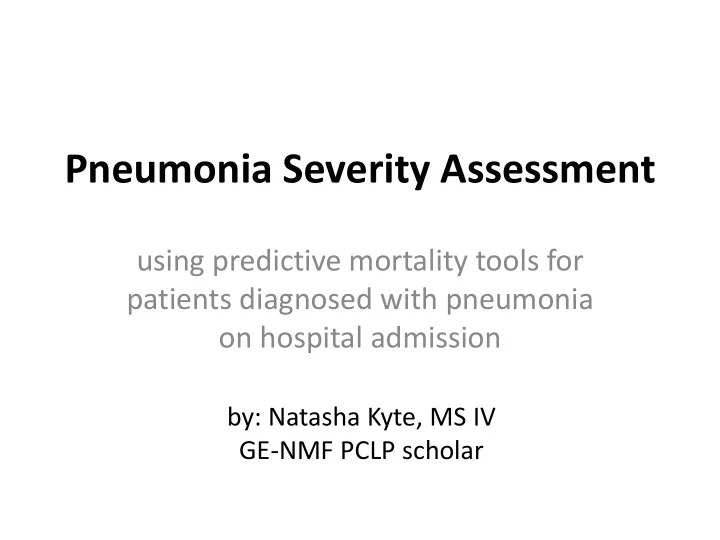

Pneumonia Severity Assessment using predictive mortality tools for patients diagnosed with pneumonia on hospital admission by: Natasha Kyte, MS IV GE-NMF PCLP scholar
Background & Significance • Each year pneumonia affects over 6 million Americans* • The total annual health care cost to treat these patients is $8.4 billion* • @ AltaMed: – In 2011, there were 226 hospital admissions due to pneumonia. – From January 2012 through May 2012, there were 96 hospital admissions due to pneumonia Reference 2
The question is ….. How many of these hospital admissions are avoidable?
Introduction to Severity Assessment/Risk stratification tools Pneumonia Severity Index (PSI) CURB65 • Widely validated • Widely validated • Proven to improve patient • Simple to calculate care • Underestimates severity in • Useful research tool young people • Complex to calculate • Does not predict need for • Underestimates severity in ICU admission or other young people complications • Does not predict need for ICU admission or other complications Reference 4
Pneumonia Severity Index (PSI) Reference 1
CURB65 Reference 1
Milliman Criteria • Hypoxia: O 2 sats <90% or pO 2 <60 or worsening chronic lung disease • Outpatient management failure • Complications of pneumonia (ie. Empyema) • Appropriate diagnostic testing & tx unavailable • Hemodynamic instability • PSI class IV/V or CURB-65 score >3 • Immunocompromised
Research Project • Objective: to compare tools used to measure pneumonia severity assessment to determine the appropriateness of patients admitted to hospital for pneumonia • Design: Retrospective chart review • Setting: White Memorial Medical Center (WMMC) is 353- bed not-for-profit, faith-based, teaching hospital that serves downtown Los Angeles and nearby communities. • Patients: adults diagnosed with pneumonia upon admission to hospital from Jan 2012 – May 2012 • Methodology: hospital admission records for patients were reviewed to determine PSI, CURB65 & Milliman criteria for each patient. • Results: (n=20) low risk- PSI 60% CURB65 65% Milliman 30%
Results 14 16 14 12 12 10 10 8 CURB65 CURB65 8 PSI PSI 6 Milliman Milliman 6 4 4 2 2 0 0 out-patient in-patient
Discussion • Limitations – Retrospective design is a disadvantage for data availability – Small sample size – only hospitalized patients in a single center were included – Assumed missing values – Assumed community acquired pneumonia for each pneumonia diagnosis – Patients admitted during non-peak season • Future direction – Predictive biomarkers such as procalcitonin
Conclusion • 6 out of 20 of the hospital admissions did not meet the Milliman criteria, these 6 make up the potentially avoidable hospital admissions for pneumonia. • Using the Milliman criteria as the Gold Standard, PSI & CURB65 were sensitive, making them good screening tools. The sensitivity of PSI was 100% and CURB65 was 86%.
References: 1. Chalmers JD, Rutherford J. Can we use severity assessment tools to increase outpatient management of community-acquired pneumonia? Eur J Intern Med. 2012 Jul;23(5):398-406. 2. Dean NC, Jones JP, Aronsky D, Brown S, Vines CG, Jones BE, Allen T. Hospital admission decision for patients with community-acquired pneumonia: variability among physicians in an emergency department . Ann Emerg Med. 2012 Jan;59(1):35-41. Epub 2011 Sep 9. 3. Lutfiyya MN, Henley E, Chang LF. Diagnosis and Treatment of Community-Acquired Pneumonia. Am Fam Physician 2006;73:442-50. 4. Stanton MW. Improving treatment decisions for patients with community acquired pneumonia. Rockville(MD): Agency for Healthcare Research and Quality; 2002. Research in Action Issue 7. AHRQ Pub. No. 02-0033
Acknowledgements • Dr. Desmond Lew • Dr. Esquio Casillas • Dr. Michael Rodriguez • Dr. Martin Serota • Dr. Albert Chang • Ulysses Garcia • Jeff Nguyen • Bertha Carreno • Esparanza Andrade • GE-NMF PCLP • SIU SOM library staff
Recommend
More recommend